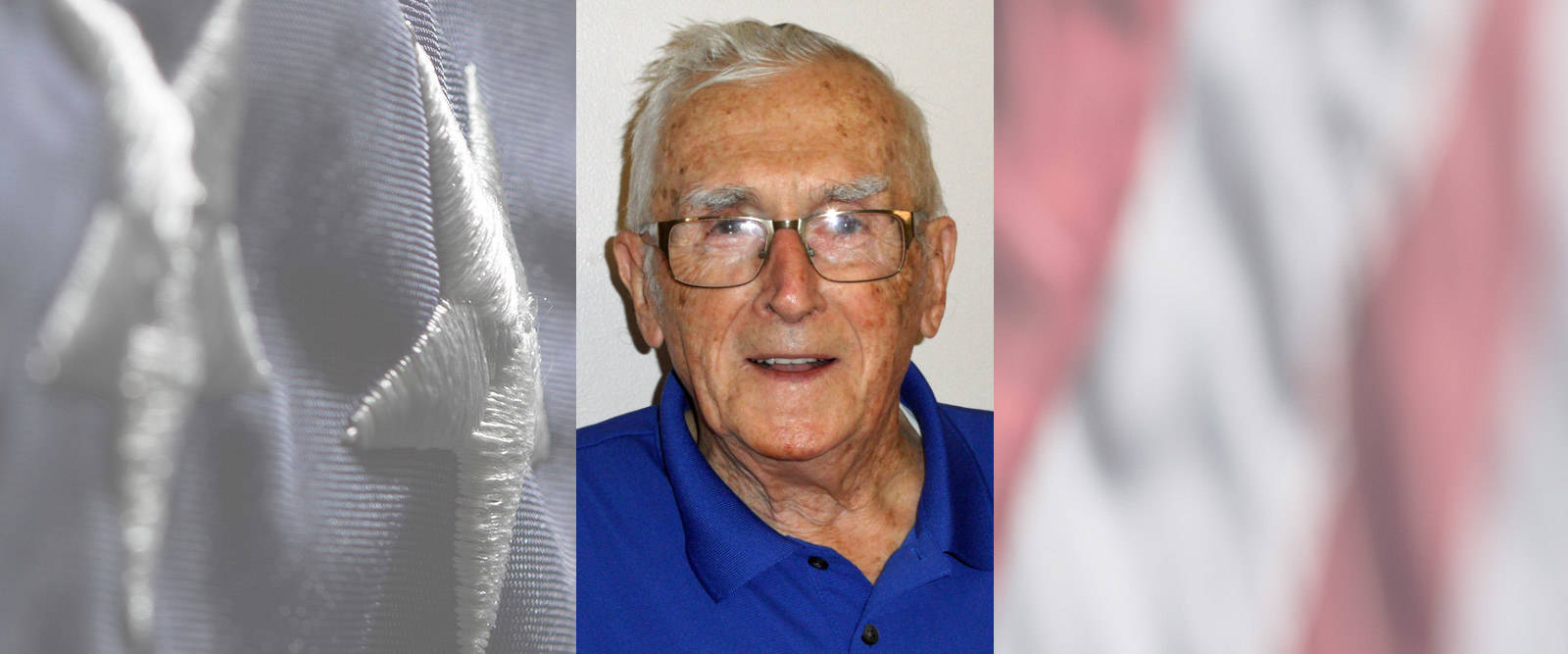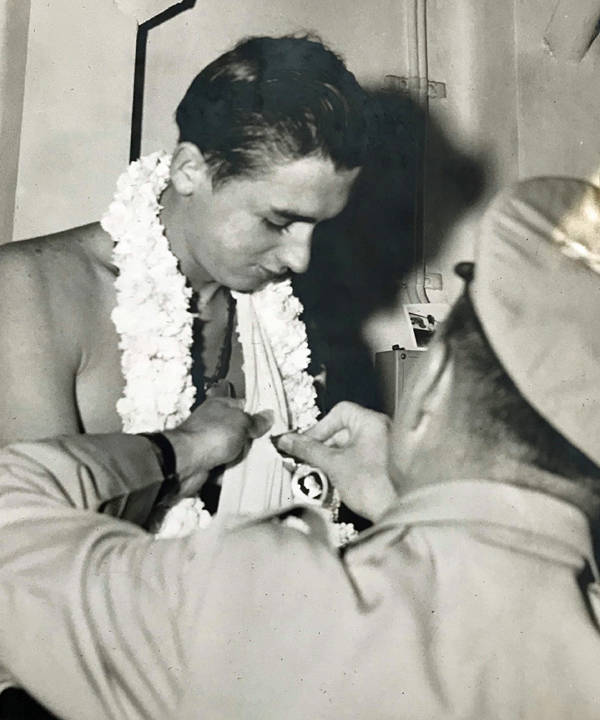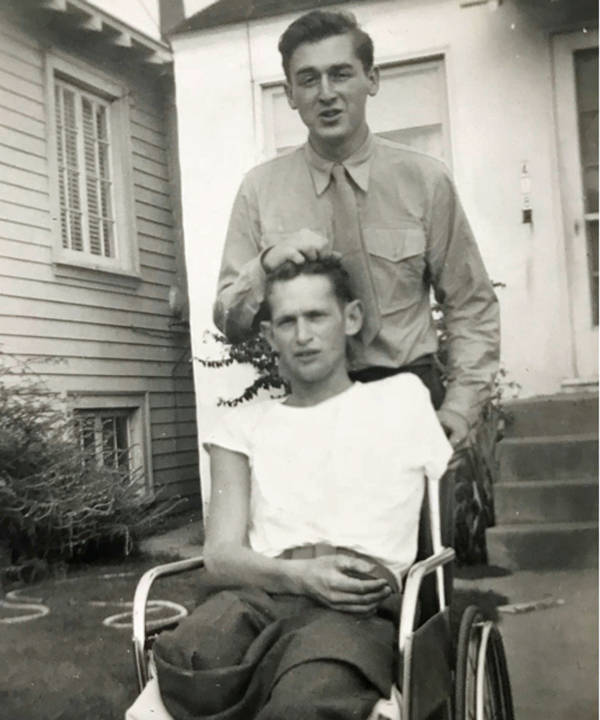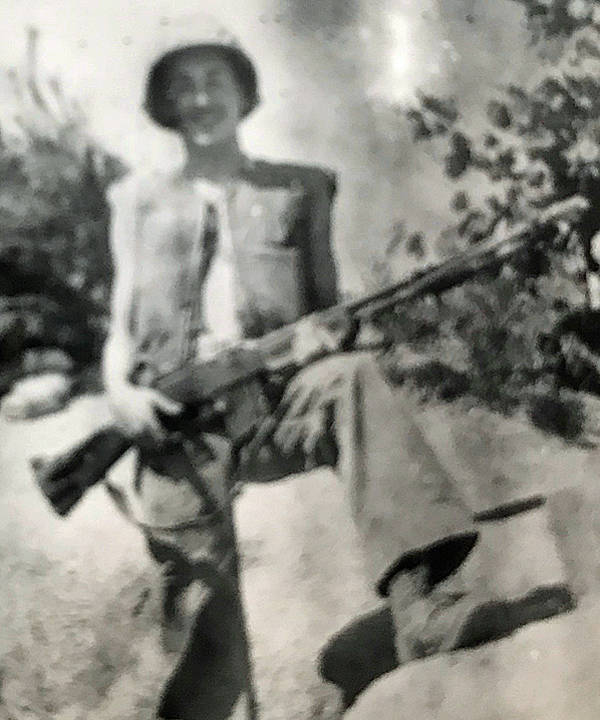U.S. Marine Corps Korean War Chicago, IL Flight date: 09/12/18
By Donna Pacanowski, Honor Flight Chicago Veteran Interviews Volunteer
A lifelong resident of the south side of Chicago, Charles Callahan was born on August 5, 1932. “Chuck” grew up with four brothers and two sisters; sadly his father passed away when Chuck was 8 years old. Chuck had many friends in high school, but was a little shy when it came to girls. On one occasion, Jeannie, a friend, said, “I know a cute blond for you.” She dialed a number and handed the phone to him, saying, “Here, talk to Rita.” Chuck had just spoken to his new girlfriend, and future wife!
With the war in Korea escalating, Chuck thought he should enlist. He was 19, looking for a job and thought the Army might teach him some skills while he served his country. His next stop was the Army recruiter; the recruiter explained the Army’s need was for paratroopers. Chuck visualized the helplessness of being shot at as he floated in the sky, then having to fight when he landed. This deflected any further thought about joining the Army. Recalling the Marine Recruit Station nearby, he walked over to the Marines and enlisted as a rifleman – a better deal. Only then did he realize that he had not spoken to anyone about his intent to enlist. He had less than nine days to tell his mother and Rita that he had enlisted before leaving for Marine Basic Training in San Diego at Camp Pendleton. Nine days later at Midway Airport, with a goodbye and hug for his mother and a farewell kiss for Rita, Chuck boarded the plane to southern California to begin his future in the Marine Corps.
After Marine Basic Training and a furlough back in Chicago, Chuck sailed for Korea. The Marines assigned him to G Company, 3rd Battalion, 1st Marine Regiment, 1st Marine Division. The unit was stationed on the Main Line of Resistance (MLR) somewhere between Seoul and Panmunjom. Although truce talks were continuing between the North Koreans and the UN forces, Chuck’s unit was under constant mortar and artillery barrage. The Marines could not return gun fire because of the rules of engagement at the time. The day Chuck arrived, the sergeant handed him a Browning Automatic Rifle (BAR) saying, “You’re our new BAR man.” Chuck argued he was not trained on the BAR; the sarge replied, “Better learn quick.” The company was located on high ground with the Marines living and sleeping in foxholes with barbed wire strung out front. Breakfast, lunch, and dinner were C-rations. Their recreation involved improving their position, stringing more barbed wire, digging better foxholes, filling sandbags, and making continuous patrols to locate enemy positions. All the while, the enemy bombed and sniped from the nearby ridges. After a few weeks, Chuck lost most of his initial fears of the shelling, and just reacted by diving into a hole.
The North Korean Forces also sent out patrols against the Marines. During one of these patrols a firefight developed; the next morning, the body of a North Korean soldier could be seen in the barbed wire in front of the Marine position. Attempts to remove the North Korean during the day would cause the enemy to bombard the approaches to the wire, and night action caused fire from both sides. Chuck recalls that after several days, the North Korean soldier disappeared from the wire and he still has nightmares about this today.
After about four months with the unit, Chuck received his first Purple Heart. He heard the pop of launching mortars and he hit the ground immediately, remembering his ears rang, and then nothing. As a fellow corpsman revived Chuck after the attack, Chuck saw the mortar round crater just inches from his foot. Luckily, the shrapnel missed him entirely; the blast’s concussion had rendered Chuck unconscious. After a short stay at the aid station, he returned to his unit. Chuck knows a miracle happened that day – his guardian angel protected him.
A month later, during an artillery bombardment, the unit’s Gunnery Sergeant Cornelius Harney was killed, and the Corpsman, Danny Skiles, was badly wounded. Danny was immediately helicoptered to the hospital ship USS Repose, where doctors removed his mangled left arm and right leg. Chuck painfully recalls unspoken memories of war like helping recover the Gunnery’s body. Two weeks later, Chuck was wounded a second time. He was flown to Japan for immediate surgery. The naval doctors determined that removing all the shrapnel would damage nerves in his arm, making his arm useless. Chuck still carries 18 metal shards in his left arm as a reminder of that action. The injury was severe enough that he could not return to Korea. He would sail on the Navy hospital ship bound for Treasure Island in San Francisco Bay.
On the ship, Chuck reconnected with the wounded Corpsman Danny Skiles. Danny was struggling with the loss of his leg and arm, but when he spotted Chuck walking down the ward, Danny excitedly yelled out, “Chuck, you miserable bastard!” The hospital staff kept them together after that immediate improvement in Danny’s attitude. (see https://www.med.navy.mil/bumed/nmhistory/Documents/Oral%20History/SKILES%20Dan.pdf page 7). At a port call in Hawaii, Danny and Chuck schemed to see the sites. Chuck dressed Danny and got him in a wheelchair, and off they rolled. A diligent sergeant stopped the two at the plank because Danny was too critical to be on the liberty list. Disappointed, Danny was rolled back to his ward, but Chuck got a memorable liberty. While ashore by himself, he did some heavy drinking and decided to call home but no pay phones were available for overseas calls. He got madder, and then drunker. On return to the ship one look from the officer at the plank, and a shout rang out, “Sergeant of the Guard, drunken Marine!” Chuck was escorted to the brig. Months later after Chuck got home, Rita reminded him about the collect call from Hawaii. It took four months to pay back her dad for the phone charges. Only years later did Chuck admit to not remembering the call.
Following his convalescence at the hospital on Treasure Island, the Marines re-assigned Chuck to Great Lakes Naval Station. For the rest of his enlistment, he had guard duty at the brig. His combat days were not over. One day while on guard duty, as Chuck escorted a prisoner, the prisoner knocked him down and proceeded to kick him in the face. By the time other guards could stop the fight, his face was a bloody mess. Rita could hardly recognize him when they met after the assault. While on active duty, Chuck received two Purple Heart Medals, National Defense Medal, United Nations Service Medal, Korean Service Medal, Republic of Korea War Service Medal, and the Navy and Marine Presidential Unit Citation.
Returning to civilian life in 1953, Chuck could finally plan a future with Rita. He held a variety of jobs, finally becoming a driver for the Gonnella Bakery company for 28 years. Chuck and Rita recently celebrated 64 years of marriage and have been blessed with three children, a son and two daughters. They have eight grandchildren and one great-grandchild. They have traveled extensively throughout the country and a few years ago, enjoyed a trip to Paris and Normandy with their two daughters.
Chuck, we honor you for your sacrifice and bravery during the Korean War. Enjoy your well-deserved Honor Flight!






